Methane International
The Global Methane Initiative Update
Issue 27, February 2012
GMI Projects Around the World
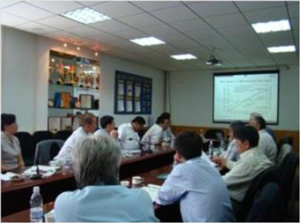 Attendees at the workshop listen to presentations on CMM issues in Mongolia.
Attendees at the workshop listen to presentations on CMM issues in Mongolia.
Since 2007, the U.S. Environmental Protection Agency (EPA) has funded projects that support the goals of the Global Methane Initiative (GMI): advancing near-term, cost-effective methane abatement or recovery and use as a clean energy source. These grants become catalysts for greenhouse gas (GHG) emission reduction projects, technology demonstration, and capacity-building efforts in GMI Partner Countries. Throughout upcoming newsletters, the Administrative Support Group (ASG) would like to highlight the progress of grant awardees.
Pre-feasibility Study on Methane Recovery and Utilization in Nalaikh Coal
Mine. In 2008, Partner organization
Mongolian Nature and Environment Consortium (MNEC)
 was awarded a $100,000 grant
to conduct a
pre-feasibility assessment (PDF, 77 pp, 3.8 MB)
was awarded a $100,000 grant
to conduct a
pre-feasibility assessment (PDF, 77 pp, 3.8 MB)
 of coal mine methane (CMM) recovery at the Nalaikh Coal Mine in Mongolia. The study
identified three drilling sites that could support a 3.6-megawatt (MW)
power generation and heating project, which will reduce 96,390 metric tons
of carbon dioxide equivalent (MTCO2E). Currently, drilling in the mine
area is being jointly financed by the Mongolian and Korean governments.
of coal mine methane (CMM) recovery at the Nalaikh Coal Mine in Mongolia. The study
identified three drilling sites that could support a 3.6-megawatt (MW)
power generation and heating project, which will reduce 96,390 metric tons
of carbon dioxide equivalent (MTCO2E). Currently, drilling in the mine
area is being jointly financed by the Mongolian and Korean governments.
Also as part of the grant, the MNEC hosted a workshop to discuss the opportunities and use of methane for sustainable development, policy and ownership issues, and identify the needs of the Mongolian mining industry regarding CMM. This past year, EPA awarded the Consortium an additional GMI grant to continue its activities to develop an assessment of Mongolian CMM resources.
Methane Recovery in the Russian Gas Sector: Capitalizing on Economic and
Environmental Benefits. In 2009, the Environmental
Defense Fund (EDF)
 received more than $280,000 for a project
that aims to establish a reliable, cost-effective system for monitoring and managing
Gazprom's
received more than $280,000 for a project
that aims to establish a reliable, cost-effective system for monitoring and managing
Gazprom's
 methane emissions. Gazprom is Russia's largest energy producer,
and working to reduce methane emissions from the company's activities would significantly
reduce methane emissions in Russia. EDF used the funding to conduct a pilot study
to assess Gazprom's methane emissions and potential cost-effective project opportunities,
and then provided recommendations for establishing a corporate methane management
system. The project also analyzed advanced economic mechanisms for attracting investment
for viable methane emission reduction projects. This project is still ongoing.
methane emissions. Gazprom is Russia's largest energy producer,
and working to reduce methane emissions from the company's activities would significantly
reduce methane emissions in Russia. EDF used the funding to conduct a pilot study
to assess Gazprom's methane emissions and potential cost-effective project opportunities,
and then provided recommendations for establishing a corporate methane management
system. The project also analyzed advanced economic mechanisms for attracting investment
for viable methane emission reduction projects. This project is still ongoing.
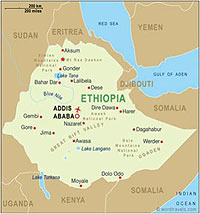 Ethiopia
Agriculture and Landfill Resource Assessment and Capacity Building.
Project Network member
Community Development Research (CDR), a U.S. nonprofit, will use its strong
African connections to help officials in Ethiopia address their
methane emissions from agriculture and landfills. Under a
$75,000 grant, CDR worked with the Ethiopian Environmental Protection Authority
to conduct an assessment of the methane reduction potential from agricultural sources
in the country and to develop their sector action plan. A workshop
was held in Addis Ababa in November to discuss the results of this work. After these
reports are finalized, they will be posted on the GMI website.
Ethiopia
Agriculture and Landfill Resource Assessment and Capacity Building.
Project Network member
Community Development Research (CDR), a U.S. nonprofit, will use its strong
African connections to help officials in Ethiopia address their
methane emissions from agriculture and landfills. Under a
$75,000 grant, CDR worked with the Ethiopian Environmental Protection Authority
to conduct an assessment of the methane reduction potential from agricultural sources
in the country and to develop their sector action plan. A workshop
was held in Addis Ababa in November to discuss the results of this work. After these
reports are finalized, they will be posted on the GMI website.
CDR also received an $80,000 grant
to work in the landfill sector, which consists mostly of uncontrolled disposal sites
managed by municipalities. The project focused on the challenges of waste disposal
through capacity building and resulted in a country-specific profile and strategic
plan. Daniel Fikreyesus, with CDR,
presented (PDF, 21 pp, 1.4 MB)
 on this project at the Africa Carbon Forum in July 2011. Similar to the agriculture
sector, CDR also held a workshop to evaluate methane reduction approaches in the
landfill sector.
on this project at the Africa Carbon Forum in July 2011. Similar to the agriculture
sector, CDR also held a workshop to evaluate methane reduction approaches in the
landfill sector.
2013 Expo Planning Underway!
Save the Date!
Save the date for the 2013 Expo. The Expo will take place on 12-15 March 2013 in Vancouver, Canada.
In 2013 GMI will be hosting its third Expo in Vancouver, Canada. To launch the planning process, the GMI Expo Task Force convened via teleconference on 25 January 2012. Participants included Partner Country representatives from Canada, China, Colombia, India, Nigeria, Poland, the United Kingdom, and the United States, as well as numerous Project Network members.
Partner organization Environment Canada, the in-country host organization, announced the Expo will be held during the week of 11 March 2013 at the Vancouver Convention Center, a state-of-the-art meeting venue. The ASG provided a brief Expo history (i.e., 2007 in Beijing, 2010 in New Delhi) and explained the role of the Task Force in the Expo process (e.g., planning, outreach). The ASG also outlined the call for abstracts, which serves to help identify technical and policy session topics and speakers, and the purpose of the project opportunity posters. Environment Canada reviewed its proposed meeting format—comprised of general plenary and concurrent sector-specific elements similar to past Expos—and invited input from Task Force members.
The Task Force teleconference concluded with a consensus to hold monthly calls leading up to the Expo; the next call will take place on Wednesday, 22 February 2012. Anyone interested in participating in the Expo Task Force and/or sharing input on possible session topics or project opportunities should email the ASG.
Subcommittee Update
Highlights from each subcommittee, including GMI's newest subcommittee—Municipal Wastewater—are listed below.
Fact Sheets Updated
In November 2011, the ASG released new GMI sector fact sheets for agriculture, coal mines, landfills, and oil and gas. The fact sheets, which are available on the GMI website, are a great resource to educate organizations about GMI activities.
GMI is seeking volunteers to translate these fact sheets into other languages. For more information or to volunteer, please contact the ASG.
Agriculture
In January 2012, GMI posted the
Resource Assessment for Livestock and Agro-Industrial Wastes—Turkey
(PDF, 55 pp, 904K). The results show that the sugar beet sector has the highest
potential to reduce methane emissions, followed by the fruit processing industry,
dairies, and slaughterhouses. Turkey has the potential to produce 31,800 kilowatts
of electricity annually from biogas harnessed from the agricultural sectors evaluated.
The ASG would like to announce that Allison Costa, with U.S. EPA's AgSTAR Program, will be joining Jorge Hilbert with Argentina's National Institute of Agriculture Technology and Anil Dhussa with India's Ministry of New and Renewable Energy, as the newest Co-Chair for the Agriculture Subcommittee. The ASG would also like to remind all Partners to submit data to populate the International Anaerobic Digester Database in the Excel template (XLS, 178K). The database will collect information about the size and type of digesters in each country, as well as planned projects. The purpose is to help others see what types of systems and technologies are working well in their region, to help GMI track digester projects, and to show where there might be a need for more digester development. Please review the glossary (PDF, 6 pp, 107K) for assistance in filling out the template. The Agriculture Subcommittee is planning its next meeting to take place within the next 6 months, with a webinar being planned for the following quarter; more information will be available soon.
Coal Mine
The Coal Mine Subcommittee is planning to hold a webinar in May 2012. The next in-person
subcommittee meeting is likely to be scheduled for the first week of September in
Australia. More information about these events will be available
soon on GMI's website.
Landfills
The Landfill Subcommittee is continuing its work on an international landfill gas
(LFG) best practices guide. The Subcommittee will be initiating a peer review process
in early 2012 and expects to publish the guide by the end of 2012. The ASG would
also like to take the opportunity to thank Gabriel Blanco from Argentina
and Rachel Goldstein from the United States for their tremendous
service and assistance to GMI as Co-Chairs to the Landfill Subcommittee. Both, have
recently changed positions within their respective countries and have stepped down
from their Co-Chair position, though Gabriel will continue to represent Argentina
within the Landfill Subcommittee as a designated country delegate. Tom Frankiewicz
with U.S. EPA's Landfill Methane Outreach Program (LMOP) will join Sandra Lopez
Tovar with Colombia's Ministry of the Environment and Sustainable
Development as the newest Co-Chair of the Landfill Subcommittee. The Landfill Subcommittee
is planning its next meeting to take place within the next 6 months, with a webinar
being planned for the following quarter; more information will be available soon.
Oil & Gas
The next Oil & Gas Subcommittee meeting will be held on 12-13 April 2012 in
Denver, Colorado, United States. The meeting will be held in conjunction
with the U.S. EPA's
Natural Gas STAR Annual Implementation Workshop
 ,
which will take place on 10-12 April 2012. The ASG has met with the Oil & Gas
Subcommittee Co-Chairs to draft the meeting agenda. Based on discussions with the
Co-Chairs, there is significant interest in discussing GMI Action Plans, National
Appropriate Mitigation Action (NAMA) plan development (templates and overall GMI
and business case context), and the upcoming 2013 GMI Expo. Additionally, Partner
Countries will be asked to discuss recent activities, along with those in the coming
year. The Co-Chairs feel that sharing anticipated activities will enable the subcommittee,
as well as Partner Countries and Project Network members, to be more supportive.
If you have any meeting agenda topic suggestions, please email them to the
ASG.
,
which will take place on 10-12 April 2012. The ASG has met with the Oil & Gas
Subcommittee Co-Chairs to draft the meeting agenda. Based on discussions with the
Co-Chairs, there is significant interest in discussing GMI Action Plans, National
Appropriate Mitigation Action (NAMA) plan development (templates and overall GMI
and business case context), and the upcoming 2013 GMI Expo. Additionally, Partner
Countries will be asked to discuss recent activities, along with those in the coming
year. The Co-Chairs feel that sharing anticipated activities will enable the subcommittee,
as well as Partner Countries and Project Network members, to be more supportive.
If you have any meeting agenda topic suggestions, please email them to the
ASG.
Municipal Wastewater
Municipal wastewater was introduced as an official GMI sector in October 2011. The
Municipal Wastewater Subcommittee will be focusing on methane reduction and reuse
from wastewater treatment systems in GMI's Partner Countries. The subcommittee is
going to be busy over the next few months organizing and planning a webinar to kick-off
the subcommittee, developing a sector action plan, and creating a municipal wastewater
factsheet. Chris Godlove with U.S. EPA's LMOP will be helping to lead the effort
as the subcommittee's first Co-Chair. The ASG
is currently recruiting nominations for other Co-Chairs and sector representatives
from interested Partner Countries.
U.S. Government's Accomplishments Report Released
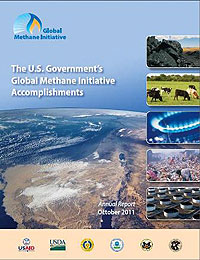 The
U.S. EPA recently completed the
2011 U.S. Government's Global Methane Initiative Accomplishments report
The
U.S. EPA recently completed the
2011 U.S. Government's Global Methane Initiative Accomplishments report
 ,
highlighting U.S. efforts to reduce and reuse methane emissions around the world.
In 2010, the United States committed another $50 million in funding
to GMI. The report documents the U.S. EPA's continued collaboration with the U.S.
Department of State, the U.S. Agency for International Development, the U.S. Department
of Energy, the U.S. Department of Agriculture, and the U.S. Trade and Development
Agency. In 2010, these agencies, working with GMI Partner Countries, completed over
550 projects, with total emissions reduction of 29 MMTCO2E.
,
highlighting U.S. efforts to reduce and reuse methane emissions around the world.
In 2010, the United States committed another $50 million in funding
to GMI. The report documents the U.S. EPA's continued collaboration with the U.S.
Department of State, the U.S. Agency for International Development, the U.S. Department
of Energy, the U.S. Department of Agriculture, and the U.S. Trade and Development
Agency. In 2010, these agencies, working with GMI Partner Countries, completed over
550 projects, with total emissions reduction of 29 MMTCO2E.
GMI Holds Side Event at COP17
In Durban, South Africa, from 28 November through 9 December 2011,
leaders from around the world gathered at the
17th Conference of the Parties (COP17)
 to the United Nations Framework Convention on Climate Change (UNFCCC) and the 7th
Session of the Conference of the Parties serving as the Meeting of the Parties (CMP7)
to the Kyoto Protocol. These representatives meet annually to assess progress in
addressing climate change. Some major outcomes from the event included:
to the United Nations Framework Convention on Climate Change (UNFCCC) and the 7th
Session of the Conference of the Parties serving as the Meeting of the Parties (CMP7)
to the Kyoto Protocol. These representatives meet annually to assess progress in
addressing climate change. Some major outcomes from the event included:
- Development of the
Durban Platform for Enhanced Action (PDF, 2 pp, 122K)
 ,
which puts a plan in place to create a new protocol to succeed the Kyoto Protocol.
,
which puts a plan in place to create a new protocol to succeed the Kyoto Protocol. - Admission that there is a significant gap between the reduction pledges to date and the level of reductions needed to limit global warming to less than 2 degrees.
- Establishment of a
Green Climate Fund (PDF, 11 pp, 191K)
 ,
which will help finance private sector activities that help to fight climate change.
,
which will help finance private sector activities that help to fight climate change.
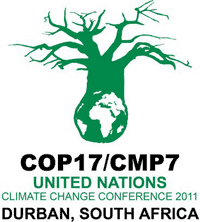 GMI
had a successful side event, "Global Methane Initiative: Achieving Cost-Effective
GHG Emission Reductions," held on Thursday, 1 December 2011, with approximately
30 people attending the event. This session featured innovations in current methane
policy and technologies by Partner Countries, as well as highlights of GMI's relationship
with the UNFCCC and other international climate efforts. Speakers included:
GMI
had a successful side event, "Global Methane Initiative: Achieving Cost-Effective
GHG Emission Reductions," held on Thursday, 1 December 2011, with approximately
30 people attending the event. This session featured innovations in current methane
policy and technologies by Partner Countries, as well as highlights of GMI's relationship
with the UNFCCC and other international climate efforts. Speakers included:
- Jonathan Pershing, State Department, Deputy Special Envoy for Climate Change—spoke about the U.S. involvement in GMI and provided a high level overview on the Initiative and its successes.
- Monica Shimamura, Co-Director of GMI's ASG—provided an overview of GMI, its successes, and the Initiatives' path forward.
- Daniel Fikreyesus, CDR—presented on the development of GMI collaboration with Ethiopia's Environment Protection Authority on agriculture work.
- Sandra Lopez Tovar, Advisor for the Climate Change Division with Colombia's Ministry of Environment and Sustainable Development—discussed GMI work in Colombia, specifically the successes of landfill development.
- Syamsidar Thamrin, Indonesian State Ministry of National Development Planning (BAPPENAS)—presented on Indonesia's developing thoughts on including methane work in their NAMA.
- Stephen de Boer, Director General Climate Change International, Environment Canada—spoke about Canada's efforts to reduce methane emissions and their involvement in GMI. Mr. de Boer also highlighted that Canada will be hosting the next Expo in Vancouver in March 2013.
The side event closed with a question and answer session with the panelists, where the audience showed interest in methane reduction opportunities. After such a successful GMI side event, the ASG is now looking forward to COP18 in Doha, Qatar. ASG is requesting our Partner Countries to provide space/sponsor a GMI side event at COP18.
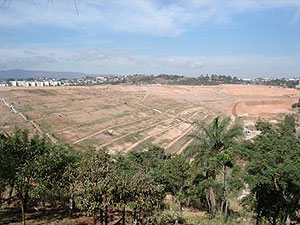 Solid Waste Treatment Center in Belo Horizonte, Brazil.
Solid Waste Treatment Center in Belo Horizonte, Brazil.
Landfill Gas Energy Project Comes On Line
GMI Partner Country Brazil is working to increase its renewable
energy production from landfill methane. With the help of
Asja Brasil
 ,
this goal is being achieved from a new LFG energy project at the Solid Waste Treatment
Center in Belo Horizonte. The landfill site was originally
assessed (PDF, 35 pp, 556K) by the U.S. EPA's LMOP for feasibility of an
LFG energy project and was
featured (PDF, 1 pg, 675K) at both the 2007 Expo in Beijing, China, and
the 2010 Expo in New Delhi, India. Currently, the site has four engines (by Project
Network member GE
Energy—Jenbacher) that produce a total of 5.5 MW. Electricity from
the facility is being supplied to the local grid.
,
this goal is being achieved from a new LFG energy project at the Solid Waste Treatment
Center in Belo Horizonte. The landfill site was originally
assessed (PDF, 35 pp, 556K) by the U.S. EPA's LMOP for feasibility of an
LFG energy project and was
featured (PDF, 1 pg, 675K) at both the 2007 Expo in Beijing, China, and
the 2010 Expo in New Delhi, India. Currently, the site has four engines (by Project
Network member GE
Energy—Jenbacher) that produce a total of 5.5 MW. Electricity from
the facility is being supplied to the local grid.
Source: GE, "GE's
Landfill Gas Technology Powers New Brazil Landfill Gas-to-Energy Project
 ,"
31 October 2011.
,"
31 October 2011.
GMI Outreach
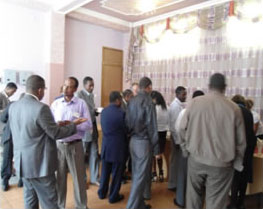 Participants network during the event.
Participants network during the event.
Africa
In November 2011, Swarupa Ganguli (of the U.S. EPA's LMOP) and Allison Costa (with
the U.S. EPA's AgSTAR Program) traveled to Ethiopia to participate
in a two-day workshop on landfill and agricultural methane reduction activities.
Over 80 participants from across the country attended the workshop, including representatives
from 13 municipalities. Also in attendance were representatives from federal agencies
such as Ethiopia's Environmental Protection
Authority
 (a Partner organization) and the Ministry of Urban
Works and Construction
(a Partner organization) and the Ministry of Urban
Works and Construction
 ,
as well as representatives from international donor agencies such as
KfW Banking Group
,
as well as representatives from international donor agencies such as
KfW Banking Group
 ,
Agence Française de Développement,
the United Nations Environment Programme
,
Agence Française de Développement,
the United Nations Environment Programme
 ,
and the World Bank
(a Project Network member). The first day focused on landfills, featuring a presentation
from Ms. Ganguli on LFG energy project best practices and lessons learned. The second
day focused on agricultural methane; Ms. Costa presented lessons learned from U.S.
agricultural methane reduction projects and the AgSTAR program. More information
on this event can be found on GMI Ethiopia's
website
,
and the World Bank
(a Project Network member). The first day focused on landfills, featuring a presentation
from Ms. Ganguli on LFG energy project best practices and lessons learned. The second
day focused on agricultural methane; Ms. Costa presented lessons learned from U.S.
agricultural methane reduction projects and the AgSTAR program. More information
on this event can be found on GMI Ethiopia's
website
 .
.
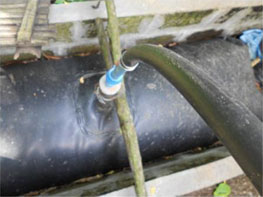 Tube-bag anaerobic digester at the Farm of Lolita Braza. The biogas produced by
the digester has provided energy for three families.
Tube-bag anaerobic digester at the Farm of Lolita Braza. The biogas produced by
the digester has provided energy for three families.
Asia
Following a July 2011 GMI training in the Philippines on the construction
and installation of tube-bag digesters, interest in the technology continues to
build among pig farmers. In October, Buklod-Unlad Multi-Purpose Cooperative—an
organization that helps pig farmers improve their livelihoods via access to sustainable
technologies—held another training session at the International Training Center
for Pig Husbandry in Batangas. The session covered how to install low-cost tube-bag
anaerobic digesters. The Cooperative has also been active in monitoring sites where
the digesters are already in place and meeting with government officials to promote
the digesters' use at pig farms throughout the country.
In October 2011, GMI staff traveled to Dhanbad, India, to attend the first Indo-U.S. workshop on CMM. The goal of the workshop was to share information on coal seam gas as well as drainage and utilization technologies with local mining officials. Presentation topics included financial feasibility of coalbed methane (CBM)/CMM, mine degasification systems, directional drilling, well logging, and sustainability. The workshop included a site visit to the Parbatpur CBM development project, where visitors toured three active wells and a small compressed natural gas operation that supplies gas to a steel plant in Bokoro.
In October 2011, Roger Fernandez of the U.S. EPA traveled to China to meet with officials from the China National Petroleum Corporation, the China Southeastern Oil and Gas Corporation, SinoChem, China National Petroleum University, SinoPec, Frontier and Freet Energy, and the Shanghai Academy of Environmental Science. Work continues in the country to implement methane leak detection and measurement programs.
In October 2011, GMI staff traveled to Vietnam to meet with officials in Hanoi at the U.S. embassy, VINACOMIN, and the Institute of Mining Science and Technology (a Project Network member). Meetings were held to discuss CBM and CMM project development at four coal mines in Mao Khe, Quang Hanh, Duong Huy, and Khe Cham.
In November 2011, Chris Godlove, with the U.S. EPA's LMOP, traveled to Indonesia
to attend the Asia Pacific Roundtable for Sustainable
Consumption and Production
 conference. GMI staff made two presentations at the conference and attended meetings
with officials from the U.S. embassy, the Association of Indonesia Municipalities,
and the Ministry of Environment. Staff also visited the Solo, Piyangan, and Bantar
Gebang landfills. For more information, including presentations, visit the
conference website
conference. GMI staff made two presentations at the conference and attended meetings
with officials from the U.S. embassy, the Association of Indonesia Municipalities,
and the Ministry of Environment. Staff also visited the Solo, Piyangan, and Bantar
Gebang landfills. For more information, including presentations, visit the
conference website
 .
.
In November 2011, Felicia Ruiz, with the U.S. EPA's Coalbed Methane Outreach Program (CMOP), traveled to Kazakhstan to meet with organizations regarding the potential for methane recovery projects. She met with organizations such as KazTransGaz,a government-owned company responsible for gas processing and gas transportation. The company discussed four projects where GMI assistance and feasibility studies could be helpful. Ms. Ruiz also met with the Ministry of New Industry and Technology to discuss the development of CBM and CMM projects in the country. Ms. Ruiz also met with the Methane Center, as well as the Ministry of Environment, to learn about CMM project development opportunities.
Central America/South America
In September 2011, Carey Bylin, from the U.S. EPA's Natural Gas STAR Program, traveled
to Colombia to meet with representatives from Ecopetrol, Colombia's
state-owned oil and gas company. The goal was to introduce key personnel at Ecopetrol
to staff from GMI in order to develop a work plan for future collaboration. GMI
also conducted a training session at the Centro de Tecnología de Gas de Colombia,
a research organization that provides technical assistance to natural gas transmission
and distribution companies in Colombia. The training, attended by 20 participants,
focused on the major sources of methane emissions from gas transmission and distribution,
as well as the tools and techniques needed to carry out a methane emissions measurement
study.
In October 2011, Chris Godlove, from the U.S. EPA's LMOP, attended a wastewater event—Reducción de GEI en el Tratamiento de Aguas Residuales—in Chile. During the event, he presented information on GMI's newest sector, municipal wastewater. Mr. Godlove also visited the El Molle Landfill to become familiar with the landfill and assess its candidacy for an LFG energy project. He also visited the new 12 MW Loma Los Colorados LFG energy project and met with a working group at the Ministry of Energy in Santiago to discuss the potential and current status of other LFG energy projects.
In October 2011, Chris Godlove also traveled to Brazil to meet with organizations regarding upcoming activities. A site visit to the Contagem Landfill was conducted to determine if an LFG energy project was viable. GMI also went on a tour of potential industrial LFG energy end users to meet with plant representatives and discuss the potential of using the LFG produced at the Contagem Landfill to provide energy to the plant.
On 14 November 2011, GMI, along with the Central American Commission for Environment and Development (CCAD), co-hosted a Landfill Construction, Operations, and Landfill Gas Workshop in San Salvador, El Salvador. CCAD brought landfill experts from the United States to present on landfill construction, landfill operations, and e-waste management. Participants came from all over the region, including Belize, Costa Rica, Dominican Republic, El Salvador, Guatemala, and Panama to learn about LFG projects. The agenda and presentations (Spanish only) are posted on GMI's website.
On 30 November 2011, GMI attended the II Simposio Internacional: Calentamiento Global
y Rellenos Sanitarios in Pasto, Colombia. GMI presented during
the conference on the
Colombia Landfill Gas Model
 ,
which is used to help landfill owners and operators evaluate the feasibility and
potential benefits of collecting and using LFG for energy recovery in Colombia.
Information on the event is posted online on
GMI's website. Later in December 2011, GMI—in collaboration with ANDESCO—hosted
a Colombia Landfill Gas Model Workshop in Bogota, Colombia. Representatives from
the U.S. EPA's LMOP presented information about GMI, LFG control and collection
systems, and the
Colombia Landfill Gas Model
,
which is used to help landfill owners and operators evaluate the feasibility and
potential benefits of collecting and using LFG for energy recovery in Colombia.
Information on the event is posted online on
GMI's website. Later in December 2011, GMI—in collaboration with ANDESCO—hosted
a Colombia Landfill Gas Model Workshop in Bogota, Colombia. Representatives from
the U.S. EPA's LMOP presented information about GMI, LFG control and collection
systems, and the
Colombia Landfill Gas Model
 .
The workshop also included presentations on LFG projects currently operating in
Colombia. The agenda is posted on
GMI's website and photos and presentations from the event (Spanish only)
are posted on
ANDESCO's website
.
The workshop also included presentations on LFG projects currently operating in
Colombia. The agenda is posted on
GMI's website and photos and presentations from the event (Spanish only)
are posted on
ANDESCO's website
 .
.
Europe
On 31 October-4 November 2011, GMI traveled to Turkey to attend
and present at the IWES 2011
Waste Technologies Symposium and Exhibition
 .
In addition to the conference, GMI representatives met with officials from the Kocaeli
Landfill and Incineration Plant, Ortadogu Energji, and Istanbul Technical University
to discuss GMI and future LFG recovery and improvement projects.
.
In addition to the conference, GMI representatives met with officials from the Kocaeli
Landfill and Incineration Plant, Ortadogu Energji, and Istanbul Technical University
to discuss GMI and future LFG recovery and improvement projects.
 On
2-4 November 2011, the Sixth International Symposium on Non-CO2 Greenhouse
Gases (NCGG-6) took place in the Netherlands. GMI led a panel discussion
addressing global opportunities to reduce methane emissions from wastewater treatment
plants. The panel included an overview of GMI's focus within the sector and was
followed by presentations from a private sector firm focused on anaerobic digesters,
as well as overviews of methane capture and use opportunities in Brazil
and across Latin America. Presentations are posted at the conference
website
On
2-4 November 2011, the Sixth International Symposium on Non-CO2 Greenhouse
Gases (NCGG-6) took place in the Netherlands. GMI led a panel discussion
addressing global opportunities to reduce methane emissions from wastewater treatment
plants. The panel included an overview of GMI's focus within the sector and was
followed by presentations from a private sector firm focused on anaerobic digesters,
as well as overviews of methane capture and use opportunities in Brazil
and across Latin America. Presentations are posted at the conference
website
 ,
including the U.S. EPA's Paul Gunning's
keynote address (PDF, 26 pp, 362K)
,
including the U.S. EPA's Paul Gunning's
keynote address (PDF, 26 pp, 362K)
 .
.
In November 2011, Tom Frankiewicz, from the U.S. EPA's LMOP, attended and exhibited
at the International Solid Waste Association's
Annual Beacon Conference
 in Novi Sad, Serbia. Mr. Frankiewicz presented "Global Methane
Initiative: Opportunities for Advancing Landfill Gas Energy in Central and Eastern
Europe," which provided general observations and case studies from Central
and Eastern Europe and an overview of the LFG industry, market, and project opportunities
in the area. After the conference Mr. Frankiewicz met with representatives from
Elektrovojvodina, an electrical distribution company, to discuss interconnect procedures
and general renewable energy considerations. He later met with representatives from
Serbia's Ministry of Environment (a Partner organization) and the Department of
Renewable Energy to discuss policies and incentives that will make LFG energy projects
more feasible and attractive to developers.
in Novi Sad, Serbia. Mr. Frankiewicz presented "Global Methane
Initiative: Opportunities for Advancing Landfill Gas Energy in Central and Eastern
Europe," which provided general observations and case studies from Central
and Eastern Europe and an overview of the LFG industry, market, and project opportunities
in the area. After the conference Mr. Frankiewicz met with representatives from
Elektrovojvodina, an electrical distribution company, to discuss interconnect procedures
and general renewable energy considerations. He later met with representatives from
Serbia's Ministry of Environment (a Partner organization) and the Department of
Renewable Energy to discuss policies and incentives that will make LFG energy projects
more feasible and attractive to developers.
On 15 December 2011, GMI organized and co-hosted an oil and gas workshop in
Russia with the National Research University
Higher School of Economics
 and the EDF. Scott Bartos, from the U.S. EPA's Natural Gas STAR Program, attended
the workshop, which included a discussion on developing corporate GHG inventories
for oil and gas operations. It also emphasized how important high-quality emissions
data are to the development of viable mitigation measures and corporate decision-making
to address GHG emissions.
and the EDF. Scott Bartos, from the U.S. EPA's Natural Gas STAR Program, attended
the workshop, which included a discussion on developing corporate GHG inventories
for oil and gas operations. It also emphasized how important high-quality emissions
data are to the development of viable mitigation measures and corporate decision-making
to address GHG emissions.
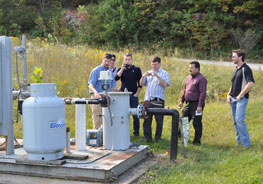 Participants from the site tours visit the flare station at EnergyXchange in Burnsville,
North Carolina.
Participants from the site tours visit the flare station at EnergyXchange in Burnsville,
North Carolina.
North America
From 26 to 30 September 2011, representatives from Mexico and
Serbia traveled to the United States to attend a four-day
tour of LFG energy project sites in Georgia, North Carolina, and South Carolina.
Nearly 20 people participated in the tours and visited a total of seven LFG energy
projects. Site visits provided the participants with ideas for successfully utilizing
LFG in direct-use applications, which are not typical in Mexico and Serbia. This
was the second study tour of LFG energy projects in the U.S. conducted by the U.S.
EPA under GMI.
Recent Developments and Resources
- On 16 February 2012, U.S. Secretary of State Hillary Rodham Clinton,
along with environmental ministers and ambassadors from Bangladesh, Canada,
Ghana, Mexico, Sweden, the United States and the executive
director of the United Nation Environment Programme,
announced the launch
 of a new international initiative that will focus efforts on reducing short-lived
climate pollutants including black carbon, hydrofluorocarbons (HFCs), and methane.
Information and press releases from the GMI Partner Countries involved can be found
on GMI's News and Events Page.
of a new international initiative that will focus efforts on reducing short-lived
climate pollutants including black carbon, hydrofluorocarbons (HFCs), and methane.
Information and press releases from the GMI Partner Countries involved can be found
on GMI's News and Events Page. - Partner Country Australia passed a plan for a carbon tax in July
2011, as part of their
Clean Energy Future (CEF) Plan
 .
The plan includes comprehensive measures aimed to reach Australia's GHG emission
reduction targets and will establish a carbon pricing mechanism by 1 July 2012.
The mechanism is expected to tax 500 of Australia's biggest emitters. Included in
the CEF Plan is more than $13 billion in assistance for clean energy projects.
.
The plan includes comprehensive measures aimed to reach Australia's GHG emission
reduction targets and will establish a carbon pricing mechanism by 1 July 2012.
The mechanism is expected to tax 500 of Australia's biggest emitters. Included in
the CEF Plan is more than $13 billion in assistance for clean energy projects.
In this edition:
- GMI Projects Around the World
- 2013 Expo Planning Underway!
- Subcommittee Update
- U.S. Government's Accomplishments Report Released
- GMI Holds Side Event at COP17
- Landfill Gas Energy Project Comes On Line
- GMI Outreach
- Recent Developments and Resources
ASG Corner
 Welcome! Ida Arabshahi is the new
Oak Ridge Institute for Science and Education fellow at the ASG and will support
GMI activities in upcoming months. Ida holds a dual master's degree in natural resources
and sustainable development from American University in Washington, D.C., and the
University for Peace in Costa Rica. Before joining GMI, Ida worked as a fellow with
the Climate Science and Impacts Branch in the U.S. EPA's Climate Change Division
and spent a year teaching English in Mallorca, Spain. She is fluent in Farsi and
speaks Spanish. In her spare time, Ida enjoys yoga, swimming, and biking. Please
join us in welcoming Ida to the ASG team.
Welcome! Ida Arabshahi is the new
Oak Ridge Institute for Science and Education fellow at the ASG and will support
GMI activities in upcoming months. Ida holds a dual master's degree in natural resources
and sustainable development from American University in Washington, D.C., and the
University for Peace in Costa Rica. Before joining GMI, Ida worked as a fellow with
the Climate Science and Impacts Branch in the U.S. EPA's Climate Change Division
and spent a year teaching English in Mallorca, Spain. She is fluent in Farsi and
speaks Spanish. In her spare time, Ida enjoys yoga, swimming, and biking. Please
join us in welcoming Ida to the ASG team.
Sincerely,

Henry Ferland
Co-Director, ASG

Monica Shimamura
Co-Director, ASG